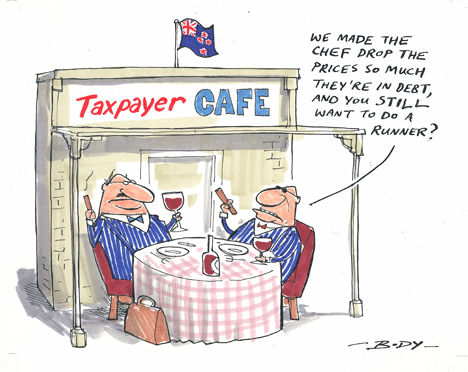
Here's my Top 10 links from around the Internet at midday in association with NZ Mint.
I welcome your additions in the comments below or via email to bernard.hickey@interest.co.nz.
I'll pop the extras into the comment stream. See all previous Top 10s here.
The theme du jour is to print and repress. Number 7 worth a read.
1. Australian house prices falling - Along with what's happening in China, this is the key variable to watch for New Zealand.
Australia is our largest trading partner.
Its consumers are our biggest buyers of exports and our biggest tourists.
Australian consumption will track with house prices.
House prices over there held up over the last couple of years because of the mining boom and various bits of government stimulus.
Now that's wearing off and the slowing of lending growth is hitting house prices and consumer spending.
Here's the Wall St Journal with this handy graphic below on how Australia's housing market is now joining the rest of the world in decline. Part of the driver is a surge of new supply, particularly of apartments. If only we had the same. HT Hugh via email.
In Australia, according to the country's Bureau of Statistics, new-home construction has jumped 26% in just the last year as of June to about 165,549 units, and is up 10% from 2006. Driving the gains is the state of Victoria, whose capital is Melbourne, Australia's second-largest city, where home construction is up 40% since 2006 at 54,476 units last year. About 10% of the 120,000 new homes approved for construction by city governments in Australia in the past year were apartments in Melbourne, according to city administrators and the bureau of statistics.
"Melbourne is vastly oversupplied and underfinanced," said Andrew Donnelly, chief executive of global investment group Whiterock Capital Partners, which acts on behalf of international investors buying property in Australia. "Most of the projects that have been sold there are never going to see the light of day due to a lack of commitment from the major banks. Perth is undergoing a correction and is too much of a one-horse town."
So far, Australia's big four banks—Australia & New Zealand Banking Group Ltd., Commonwealth Bank of Australia, Westpac Banking Corp. and National Australia Bank Ltd.—appear to be weathering the turn, though scrutiny could increase if the market worsens. The four hold more than A$850 billion, or over 80%, of Australia's mortgages, though Fitch estimated last year that they could withstand a price drop of up to 40%.
While acknowledging the risks, the banks defend their exposure saying they have low loan-to-value ratios. In its latest third-quarter results, Westpac—Australia's second-largest lender by market value—said it doesn't have any immediate concerns about the recent price declines, with the bank "seeing relatively low levels of mortgage delinquencies" compared with other parts of the world, according to spokesman Paul Marriage.
2. Don't rely on China - Harvard Economics Professor Dani Rodrik writes here at FT.com that the developed world shouldn't and can't rely on the emerging markets of China, India, Brazil and Africa to pull it out of the slump it's going back into.
Sustained growth, of the type that a handful of countries in Asia have managed to generate, requires more than conventional macroeconomic and openness policies. It requires active policies to promote economic diversification and foster structural change from low-productivity activities (such as traditional agriculture and informality) to mostly tradable higher-productivity activities. It requires pulling the economy’s labour force into sectors that are on the automatic escalator up, such as formal manufacturing.
This structural transformation is rarely the product of unassisted market forces. It is typically the result of messy and unconventional interventions that range from public investment to subsidised credit, from domestic-content requirements to undervalued currencies. Few countries have managed such industrial policies well.
An additional complication now is that policymakers in the US and Europe have long stopped viewing subsidies and undervalued currencies in developing nations with benign neglect. With high unemployment and stagnant economies, they are likely to be even more vociferous in opposing such policies.
Hence, the policies optimists hope will sustain growth in the emerging markets are unlikely to work, while the policies that would deliver growth are unlikely to be permitted by industrial countries. Growth in the developing world will most likely remain episodic and too weak to propel the world economy.
3. More European money markets mayhem - FTAlphaville looks through the latest tea leaves from the European Central Bank's marginal lending facility and finds some ominous moves.
There’s been a bit of a bump in bank borrowings from the ECB’s overnight Marginal Lending Facility (MLF).
At €2.82bn it’s a jump up from the previous day’s €555m (or €90m before that), while overnight deposits are high but have been rising, mostly predictably, through mid- to late August.
Here’s the thing: MLF borrowings have spiked to past the €1bn mark already this month, reaching €4bn on 10 August. So it’s not unheard of even during the current market stress. Still, at the time this seemed to be longer-term liquidity expiring on one day, and banks borrowing the difference overnight in the MLF, then using them for a fresh six-month refinancing operation.
4. Side deals - The Greek bailout seems to be unraveling as various countries strike side deals. This could get uglier in the coming days.
Two of the eurozone’s key creditor countries said on Thursday that their backing for Greek bail-out loans may be contingent on securing concrete collateral from Athens, a move that would create fresh hurdles to the new €109bn Greek rescue that may be difficult to surmount.
The announcements by Austria and the Netherlands, two of the eurozone’s six triple A rated members, follow a tentative deal reached on Tuesday between Athens and Finland, another triple A eurozone country which for months has demanded collateral in return for its support for the bail-out.
The Greek bail-out deal reached last month allowed for such bilateral agreements as a way to placate the Finnish government. Senior eurozone finance ministry officials started a two-day meeting to review the deal in Brussels on Thursday.
5. The world's strongest banks - Global Finance Magazine has published its list of the world's strongest banks, which puts Rabobank at 6th, NAB (BNZ) and CBA (ASB) tied for 12th, Westpac at 14th and ANZ (National) at 18th.
6. Not such a Fair Go - TVNZ's Fair Go programme last night reported on an insurance claim from a rental property investor that was refused by Westpac and Lumley after their house in Clinton (central Otago) burnt down. The claim was declined because they hadn't mowed their lawn and hadn't told the insurer it was unoccupied.
It doesn't look good for Westpac or Lumley. But I do wonder about a young couple (with a toddler) buying an investment property in a town in between Gore and Balclutha.
A lesson for quite a few people, I suspect.
7. 'Just print and repress' - James K Galbraith points out via this Reuters analysis that America (and Japan) can get away with an unsustainable government debt outlook (200% of GDP by 2035) as long as it keeps printing money and can repress its long and short term interest rates at very low and or negative real rates.
No worries then.
Here's the (Turning Japanese) thinking.
The point at which the euro crisis went into overload was when creditors refused to lend at rates that squared that circle. They lacked confidence in government budget and growth assumptions, and the political and central bank structures had no instant mechanism to restore it. The interest rate was the decider.
That seems to be how the United States and Japan are getting away with similarly scary -- more scary in Japan's case -- deficit and debt projections than the euro zone casualties.
The U.S. Congressional Budget Office (CBO), for example, estimates U.S. federal debt as a percentage of national output could hit almost 200 percent by 2035 and 300 percent by 2050, leading to net interest payments of a whopping 20 percent plus of GDP. That's clearly not sustainable, given the scale of budget cuts and primary budget surpluses that would need to be generated to rein it back in.
But liberal U.S. economist and University of Texas professor James Galbraith argues the key mistake made by the CBO is to assume the U.S. must offer a real interest rate on public debt higher than the projected real growth rate. This, he wrote in a recent paper, is unnecessary for a country that will never default on debts denominated in the currency it can print -- debt ceiling wrangles aside -- and where average real returns on public debt were negative in 18 of 36 years from 1945 to 1980.
As runaway inflation is a "fringe fear," it was possible for the U.S. to run modestly negative real interest rates on public debt while sustaining a large primary budget deficit almost indefinitely as long as Treasuries offer a liquid, safe market for the world's monetary assets, Galbraith added.
Far from fleeing U.S. debt, investor behavior since the credit and growth downgrades have neatly introduced Galbraith's negative real returns.
Ten-year U.S. debt yields fell almost a percentage point to just above 2 percent in a month -- more than a point below the 3.3 percent headline inflation. At just 0.2 percent, two year borrowing rates are deeply negative in real terms.
8. The inevitable super power - Arvind Subramanian writes at Foreign Affairs about how China's dominance is a Sure Thing and it was time India and America showed a bit more humility.
A repeat of the Suez crisis may seem improbable today. But the United States’ current economic situation does leave the country fundamentally vulnerable in the face of China’s inescapable dominance. The United Kingdom was playing with a weak hand during the Suez crisis not just because it was in debt and its economy was weakening but also because another great economic power had emerged.
Today, even as the United States’ economy is structurally weak, its addiction to debt has made the country dependent on foreigners,and its prospects for growth are minimal, a strong rival has emerged. China may not quite be an adversary, but it is not an ally, either. Macmillan’s 1971 prophecy that the United States might decline “in 200 years” betrayed a mechanical interpretation of history: it projected enduring dominance for the United States, much like his own country had enjoyed.
But China could accelerate the patterns of history—and make the United States confront its decline much sooner than Macmillan anticipated or even than most people expect today
9. Totally OK Go does The Muppets theme song.
10. Totally Turning Japanese - Is this what the rest of the developed world is doing? HT Gareth.
15 Comments
A little voice has told me the Greeks are asking for quotes on an order for ten blow up islands of at least one hectare in area each..payment in Greek govt bonds plus a 50% bonus!...now why would the Greeks want fake islands....hmmmmm.
FYI more from the WSJ (via the Oz) on these stresses in the European money markets. It's not getting better. The mention of Rabo being cautious about lending to others interesting.
NEW signs of stress are piling up in the ailing European banking system.
Commercial banks boosted their reliance on the European Central Bank, borrowing €2.82 billion ($3.9bn) from an emergency lending facility on Tuesday, while other banks continue to park unusually large amounts with the central bank, according to data released yesterday.
While the amount of borrowing is tiny relative to the multi-trillion-euro European banking system, it, and the increase from €555 million a day earlier, nonetheless suggest that some lenders are struggling to borrow from traditional funding sources, such as the capital markets or other banks.
The ECB charges a punitive 2.25 per cent interest rate to borrow from its facility, well above what a healthy bank typically would pay to borrow via other channels and Tuesday's total is well above normal.
Adding to the jitters, executives at Rabobank said the Dutch lender is growing increasingly cautious about lending money to rival banks.
"Market crash 'could hit within weeks', warn bankers"
But not before the pollies and bankers and other crooks have moved their loot to their RR boot.
Isn't Clinton in Southland, where a 3br home on 1700m costs $85k compared to $850k in central Otago...
Actually it is in Otago, South Otago. Near the southland boundary, but definately on the OTAGO side. But not central.
Re; the Westpac insurance piece - when dealing with insurers always seek written confirmation that notices and amendments have been received. Dont give the buggers any excuse not to pay out - read the policy in every detail. I dont actually think that young couple have much of a case (and the lawn thing is I sense just the TV program trying to up the ante - its hardly the central issue). However my main source of wonderment is the same as Bernard - what were they doing with the property in the first place?
Yeap you have to tell insurance company if house is not occupied..it is in the fine print. I have heard of this before. It is a bit like people not telling the bank of a change of circumstances....(if you hold a mortgage)
Right...so when the kids are at school and the old sods are at work and the house in not occupied...the insurance doesn't work....nor on the long weekends when you go to the beach...or at xmas when you go to suffer at the inlaws...
Dont be silly, there's a good chap Wolly.
Its typically 4-6 weeks unoccupied for a private residence.
Struth...you mean to say when I was off overseas on my extended teacher breaks...paid of course...and our place was empty...we wasn't covered....jeez...should I ask for some of the premiums back?
A US financial regulator has warned of multiplying scams involving investing in gold stocks as the price of gold has skyrocketed in recent months.
As gold prices sank for a second day from the record $1,913.50 an ounce, the Financial Industry Regulatory Authority said that investors were being caught out by both listed mining companies that overstate their gold reserves and private investment schemes that directly steal their money.
"Some of the stocks and opportunities being promoted have precious little value, and others are outright frauds," Finra said in a statement.
Any mention by the regulator of Investment Banks &/or Central Banks overstating their gold holdings?
http://www.nzherald.co.nz/business/news/article.cfm?c_id=3&objectid=107…
Unbelievable nonsense from Mai Chen in the Herald.
Not a single mention of energy security, security of supply, etc. Seemed more like an advertisment for her dubious services.
Re China as a suoerpower.
At the moment yes. But the west would be foolish to think it will last or indeed to even rely on it at all. Diversification is important ,anyone relying on it will get seriously burned with the inevitable crash. Oz and NZ commodities especially.
And a bust always follows a boom.
China is politicaly unstable and while it looks good at the moment it simply does not have the state institutions to outlast a major crisis. Western democracies do.The US will be around alot longer than the current Chinese set uo.
T
China will never be a suoerpower ...... the silly feckers can't even spell properly .






We welcome your comments below. If you are not already registered, please register to comment
Remember we welcome robust, respectful and insightful debate. We don't welcome abusive or defamatory comments and will de-register those repeatedly making such comments. Our current comment policy is here.